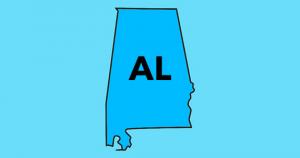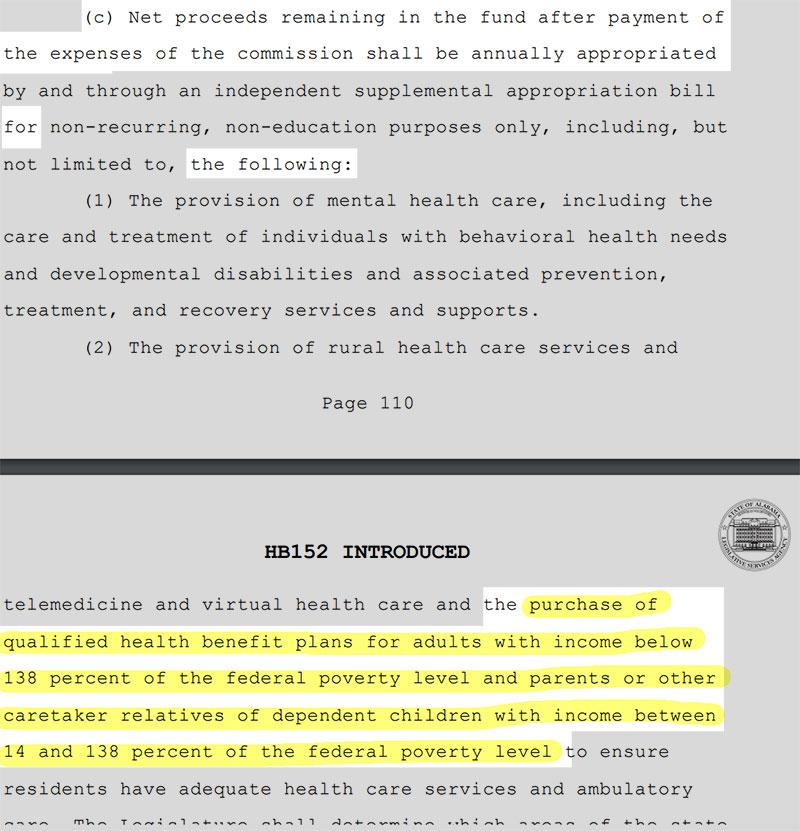First GA flirts w/the Arkansas model; now Alabama may be looking to Iowa re. Medicaid expansion?

Back in November, I noted that Georgia, one of the ten states STILL refusing to expand Medicaid coverage to hundreds of thousands of low-income residents a decade after they could have done so under the ACA, may finally be coming around...albeit via a rather silly & inefficient method. via the Atlanta Journal-Constitution:
Could Georgia adopt an Arkansas-style Medicaid plan?
Senior Republicans see an opening for a health care overhaul
Key Republicans say they’re open to legislation that would add hundreds of thousands of poor Georgians to the state’s Medicaid rolls — and bring in billions of federal dollars to subsidize it — as part of a compromise to roll back hospital regulations.
Some are giving a fresh look to a program adopted in Republican-led Arkansas, where 250,000 additional residents are eligible for Medicaid coverage under a long-running initiative that health care analysts have dubbed the “private option.”
And senior officials say a tradeoff could involve changes to certificate of need rules sought by Lt. Gov. Burt Jones and his allies that could clear the way for new hospitals, particularly in rural parts of the state, and for-profit medical offices.
As David Ramsey of the Arkansas Times explained at the time:
- Instead of enrolling the Medicaid expansion population into Medicaid itself, the state instead enrolls them into traditional Medicaid for the first month only but then moves them into ACA-compliant Qualified Health Plans instead, and then provide "wraparound funding" for cost sharing (deductibles, co-pays, etc) to bring overall coverage up to roughly what it would be under actual Medicaid.
- A portion of the enrollees deemed "medically frail" or "inactive" (ie, those who almost never actually utilize their coverage) are instead routed into traditional Medicaid after all.
- The federal government still pays 90% of the cost for both populations, with the state picking up the other 10%.
The main downside of doing it this way is that it's considerably more expensive on a per-enrollee basis than simply expanding Medicaid itself to the same population would be--about 27% more expensive per enrollee, to the best of my back-of-the-envelope math ability. The chief upside seems to be...well, if doing it this way is what it takes to get hardline Republican legislators onboard with it, fine, so be it; at least hundreds of thousands of people will gain comprehensive healthcare coverage as a result. Unfortunately, the latest status update suggests that this effort has been stalled over the past month or so:
GOP Lt. Gov Burt] Jones still signaled an openness to the concept of Medicaid expansion when talking to reporters Monday.
But nearly four weeks into the legislative session, no specifics have materialized and no bill has been filed. Crossover Day, when a bill must clear one chamber to have a smooth path to the governor’s desk, is set for Feb. 29.
Meanwhile, over in the Yellowhammer State (no, I never knew that was its nickname until today):
A few dozen Alabama lawmakers heard a presentation over the weekend on “ALL Health,” a proposed, Alabama-specific plan to use Medicaid expansion dollars to offer private health insurance through Blue Cross or another qualified insurer to low income families through a public-private partnership.
...“It’s a private-public partnership that would be unique and specific to the state of Alabama, and not cost the state any money at all for what we think will be maybe more than ten years.”
Under the plan, Alabamians making up to 138% of the federal poverty level – $20,783 a year for an individual as of January – would be eligible for full Medicaid benefits but would receive coverage through a private insurer.
...Where the plan would differ from traditional Medicaid expansion plans is that many of those newly insured would be covered through health care plans on the private marketplace, subsidized in large part through federal dollars. Awarded to states that expand Medicaid under the guidelines of the Affordable Care Act, those federal dollars, according to the AHA, would cover 100% of the expansion costs for a minimum of five years, though likely ten years.
I originally assumed that this would work similarly to the Arkansas model, but as it was explained to me, it would actually be closer to how Iowa originally expanded Medicaid:
Originally, one of Iowa’s waivers required newly eligible adults with income from 101-138% of the federal poverty level (FPL, up to $16,242 per year for an individual in 2015) to enroll in a Marketplace Qualified Health Plan (QHP) with Medicaid funds as premium assistance. The other waiver required newly eligible beneficiaries at or below 100% FPL to enroll in Medicaid managed care. Medicaid managed care options in Iowa presently range from managed fee-forservice models to capitated managed care organizations (MCOs), depending upon where beneficiaries live. Together, both waivers cover all newly eligible adults statewide.
Iowa ran their program this way for a couple of years before deciding to switch to simply going the MCO Medicaid route for the entire expansion population instead.
AHA projects that, if adopted, the “ALL Health” plan would provide coverage for an additional 260,000 Alabamians at a cost of $1.22 billion over five years. Under this base projection, however, the state would receive more than $1.5 billion in federal funds, which include additional federal dollars provided under the 2021 American Rescue Plan Act for states that expand Medicaid.
I wrote about this provision of the ARP back in March 2021.
Stay tuned...I strongly suspect that at least one of the remaining holdout states will join the expansion crowd this year, most likely Georgia, Mississippi or Alabama...but it likely will be some state-specific variant as described above. Stay tuned...
UPDATE: Wow, that was quick! My friend & colleague Louise Norris just pointed me towards this article in the Alabama Reflector...
Buried in the gambling expansion bill is a provision that might give give Alabama the chance to expand Medicaid.
But no one seems to want to discuss it.
Not Rep. Andy Whitt, R-Harvest, who has helped draft the legislation. On his way to the House floor Thursday, Whitt said that providing health care to working adults has been a point of discussion in the past, but “the governor is the only one who could expand Medicaid.”
Not Alabama Arise, which has advocated for Medicaid expansion. The group declined comment on the provision Thursday.
House Minority Leader Anthony Daniels, D-Huntsville, also avoided discussion about the bill. But he was clear when asked if he would support a gambling bill that lacked the provision.
“No,” he said.
..and found this section of the bill in question, HB152:
How to support my healthcare wonkery:
1. Donate via ActBlue or PayPal
2. Subscribe via Substack.
3. Subscribe via Patreon.




